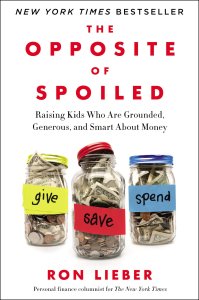Vicky Kelman
The Opposite of Spoiled: Raising Kids who are Grounded, Generous, and Smart About Money by Ron Lieber
Hmmm. What is the opposite of spoiled? Lieber actually never gives an exact definition of “the opposite of spoiled,” (aside from the second part of his title). He says it “has no useful antonym,” (p. 11) but suggests a range of values that run counter to spoiled.
I guess like that famous definition of pornography, we know spoiled when we see it (needs no definition) and we know its opposite when we see it, too.
The contemporary word I hear most often for “spoiled” is “entitled.”
I’d suggest that the best antonym for spoiled is grateful or appreciative.
 Lieber sees the topic of money (and all the conversations about money) as a teaching tool. Every question about money (are we poor? Why is that guy begging? Why did you [or didn’t you] give him money? What do you mean we can’t afford those new sneakers?) offers an opportunity to develop values as well as financial acuity.
Lieber sees the topic of money (and all the conversations about money) as a teaching tool. Every question about money (are we poor? Why is that guy begging? Why did you [or didn’t you] give him money? What do you mean we can’t afford those new sneakers?) offers an opportunity to develop values as well as financial acuity.
This approach is meant to counter the common and widely held parental belief that money is an adult concern, that talking with kids about money is not appropriate, may generate worries or may open the family ‘s private life to wider scrutiny.
Lieber makes a great case for openness around issues of money. He has a few rules for the conversation, not all of which are easy: no lying (don’t say “I can’t afford it if you can,” no silence, no gender preferences (apparently, parents are more likely to discuss money with boys), and always ask, “why do you ask?” (Because it always helps to know what sparked the question). In this approach, he takes a similar path to that of Deborah Roffman (see What I am Reading for November 2014) concerning kids’ questions about their bodies and reproduction — a question is an invitation to a conversation. Don’t miss out, even if you think you are not ready.
Lieber tells us in the beginning that this book is written for people with household incomes above $50,000 per year, but that families below that line as well as above that line can tweak and use his approach. I often found that his advice and the scenarios he describes tended toward the privileged end of the spectrum (his blindspot perhaps?) but I do agree that there is much for everyone to learn.
He offers a great perspective for helping kids develop values around money as well as some money “smarts”. (It’s never too early.) He covers all the topics families will bump into sooner or later, ranging from school tuition, to street people, to “need” vs “want,” allowance, work, volunteering, our materialistic culture and philanthropy.

